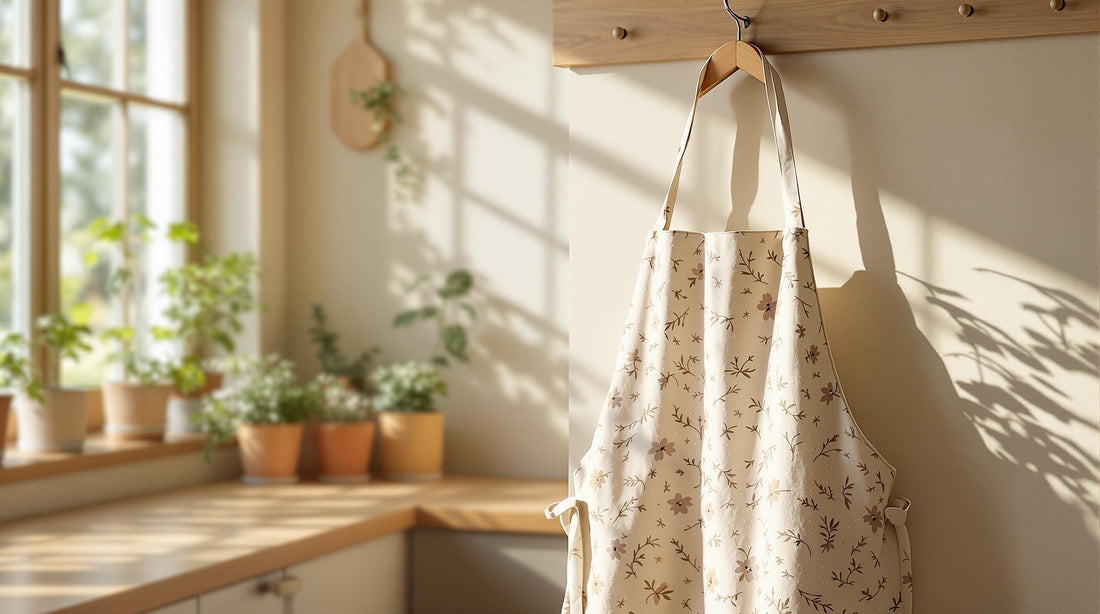
Eco-Friendly Aprons: Features to Look For
Share
Eco-friendly aprons are a smart choice for reducing waste and supporting sustainable practices. Here's what you need to know:
- Materials: Look for organic cotton, recycled fabrics, hemp, or linen. These materials avoid harmful chemicals, reduce waste, and last longer.
- Production: Choose aprons made with fair trade standards, ethical labor practices, and low-impact dyeing methods like waterless or CO2-based techniques.
- Durability: Features like double stitching, reinforced pockets, and thick hems extend the lifespan of aprons, reducing the need for replacements.
- Versatility: Functional designs include adjustable straps, smart storage pockets, and water-resistant treatments for everyday use.
- Care: Proper cleaning (e.g., spot cleaning waxed canvas or machine washing cotton) and repurposing worn aprons can further minimize waste.
Quick Tip: Look for certifications like GOTS (organic cotton), Fair Trade, or USDA BioPreferred to ensure you're making an eco-conscious choice.
This guide helps you pick an apron that balances practicality with sustainability. Keep reading for a deeper dive into materials, production methods, and top brands to consider.
What Materials Are Used in Eco-Friendly Crafting?
Materials Used in Eco-Friendly Aprons
Here’s a breakdown of materials commonly chosen for eco-friendly aprons and why they stand out.
Organic Cotton Options
Organic cotton is a go-to material for eco-friendly aprons because it’s grown without synthetic pesticides or chemical fertilizers . Unlike conventional cotton, organic farming practices focus on maintaining ecosystem balance, like crop rotation, which results in stronger fibers that make the aprons last longer .
Recycled Fabric Types
Recycled fabrics give new life to post-consumer waste, creating sturdy materials for aprons. For instance, Morada Eco Aprons combines recycled cotton and polyester:
"Our aprons are made from a durable blend of 50% recycled cotton and 50% recycled plastic bottles (polyester)."
This method not only cuts down on waste but also ensures the fabric holds up well over time.
Hemp and Linen Materials
Hemp and linen stand out for their natural qualities and eco-friendly growth processes. Hemp is known for its durability and antimicrobial properties , which help aprons resist mold, mildew, and odors. Linen, on the other hand, naturally wicks moisture, regulates temperature, and softens with every wash. Both materials require minimal chemical use during cultivation, and hemp even improves soil health while absorbing large amounts of CO2 .
Next, let’s explore how production techniques impact the sustainability of these aprons.
Production Methods
Eco-friendly aprons are crafted under strict guidelines, using advanced dyeing techniques that reduce environmental harm and prioritize ethical labor practices. From sustainable materials to responsible production, every step matters.
Fair Trade Standards
Fair Trade certification plays a key role in ethical apron production. It guarantees fair wages, safe working conditions, and promotes community well-being. For instance, Fair Trade LA creates aprons using 100% GOTS Certified Organic and Fair Trade Cotton, manufactured in a certified factory in India . This approach highlights a socially responsible and environmentally conscious production process .
Natural Dye Methods
The way fabrics are dyed has a major impact on the environment. Traditional dyeing methods are being replaced by more sustainable alternatives.
"One of the world's most polluting industries is the textile-dyeing sector, which in China and other Asian nations releases trillions of liters of chemically tainted wastewater."
To combat this, companies have introduced waterless dyeing technologies that significantly reduce environmental damage:
| Company | Technology | Environmental Impact | Notable Partners |
|---|---|---|---|
| AirDye | Waterless dyeing | Near-zero water usage | Independent manufacturers |
| ColorZen | Water-reduction | Fewer chemicals required | American textile producers |
| DyeCoo | CO2-based dyeing | Zero water consumption | Adidas |
These methods bring clear benefits. An industry expert explains:
"The use of water is cut to near-zero, sharply diminishing pollution. The quantity of chemicals is drastically reduced, while faster dyeing cycles lead to a major drop in energy consumption."
When choosing an apron, look for those made with these low-impact dyeing techniques and certified for their environmentally friendly practices.
sbb-itb-c693c43
Design and Function
Eco-friendly aprons combine sustainable materials with thoughtful design to create durable and practical workwear. Modern construction methods ensure these aprons remain useful while aligning with environmental values.
Construction Quality
High-quality construction is key to the longevity of eco-friendly aprons. Here are some standout features:
| Feature | Purpose | Environmental Benefit |
|---|---|---|
| Double Stitching | Strengthens seams and pockets | Extends product lifespan |
| Gun-Metal Rivets | Reinforces stress points | Reduces need for replacements |
| Thick Hems | Prevents fabric from fraying | Cuts down on fabric waste |
| Cross-Back Straps | Distributes weight evenly | Improves durability |
Hudson Durable Goods showcases these principles in their HDG901 apron, crafted with 16 oz waxed canvas and reinforced pockets. Their attention to detail is evident:
"Built-to-Last: Water-resistant 16 oz waxed canvas bib apron withstands harsh conditions. The pockets are reinforced with gun‑metal rivets & the hefty grommets allow for years of cinching tight. Double stitched pockets, thick hems. They actually get better with time."
Beyond sturdy construction, these aprons are designed with practical storage solutions to meet everyday needs.
Storage Features
Modern eco-friendly aprons prioritize functionality, offering smart storage options that don’t sacrifice sustainability. A satisfied Morada Aprons customer shared:
"This apron is so incredibly comfortable. I love the adjustability so it fits me perfectly and the shoulder straps prevent any neck strain! The pockets are handy, especially the upper front which is perfect for my reading glasses. Outstanding apron." – Zoe, WA
Some common storage features include:
- Upper chest pockets for small items like phones or glasses
- Deep waist pockets for tools and utensils
- Integrated towel loops for quick access
- Adjustable straps that fit waists up to 50 inches
These features make the aprons practical for a variety of tasks, while protective treatments add another layer of durability.
Protective Treatments
To enhance durability, manufacturers often apply protective treatments. For example, the Ecozen Lifestyle Shop Apron uses 16 oz waxed canvas combined with reinforced grommets and double-stitched tool pockets, offering water resistance and long-lasting performance.
Some brands also incorporate recycled materials, such as cotton and plastic bottles , to create durable aprons while maintaining eco-conscious standards.
Product Lifespan
Eco-friendly aprons can last longer with proper care and creative reuse, helping to minimize waste and reduce their overall impact.
Natural Breakdown
How quickly an apron biodegrades depends on its material, disposal method, and the surrounding conditions. For instance, some PLA-based materials can decompose in just 30 days in industrial composting facilities . However, in less ideal settings, the process takes much longer. Disposing of these items in landfills slows down decomposition and may release harmful greenhouse gases. To ensure biodegradability, look for certifications like USDA BioPreferred or BPI.
Want to get more out of your apron? Let’s talk about extending its life with proper care and reuse.
Reuse Options
Instead of tossing out worn aprons, think about giving them a second life. This not only reduces waste but also maximizes their usefulness. Keep in mind that home compostable materials may not break down effectively without the right waste-management systems .
Taking care of your apron is key to making it last. Here’s how to handle different materials:
- For waxed canvas, spot clean with lukewarm water and castile soap.
- Wash cotton in a machine with mild detergent.
- Use cold water to clean hemp or linen fabrics.
- Wipe down leather accents with a damp cloth.
When signs of wear start to show, don’t throw it away. Repurpose your apron for activities like workshops or BBQs to keep it useful and out of the trash.
Brand Reviews
Explore top apron brands that focus on sustainable materials, ethical production, and thoughtful design.
Cosmic Aprons
Cosmic Aprons provides a range of kitchen and craft aprons with functional design elements. While they deliver reliable durability, other brands stand out for their commitment to sustainability. If you're looking for aprons made with eco-conscious materials and ethical production processes, check out the options below.
Brand Comparison Chart
| Brand | Materials | Production Methods | Price Range | Key Features |
|---|---|---|---|---|
| MagicLinen | 100% Lithuanian flax linen, OEKO-TEX certified | In-house production with 20 skilled seamstresses | $70-$130 | Handcrafted quality, locally produced |
| The Citizenry | 100% linen | Small-batch production in Kannur, India | $89 | Artisans paid double fair trade wages, minimal waste |
| Anchal | GOTS-certified organic cotton | Fair Trade Federation certified, artisan-made | $68 | Eco-friendly dyes, dual production locations |
| Not PERFECT LINEN | Natural European linen, OEKO-TEX certified | Made-to-order in Lithuania | $45-$85 | Zero-waste initiative, family-owned |
| Darzah | Locally-sourced cotton blend | Handmade in Palestine's West Bank | $35-$125 | Non-profit supporting women artisans |
MagicLinen, The Citizenry, Anchal, Not PERFECT LINEN, and Darzah all excel in combining high-quality materials with ethical production practices. For example, MagicLinen oversees its entire production process in Lithuania, ensuring top-notch craftsmanship, while The Citizenry supports artisans by offering double the standard fair trade wage and keeping waste to a minimum through small-batch production.
These brands prioritize durability and longevity, making their aprons a smart choice for chefs and hobbyists alike. With sustainable certifications and waste-conscious manufacturing, they deliver both performance and eco-conscious value.
Buying Guide
This guide builds on the earlier discussion of features and production methods, helping you zero in on the key factors to keep in mind when choosing an eco-friendly apron.
Main Points
When shopping for an eco-conscious apron, focus on three main areas: materials, production methods, and durability. For example, aprons made with GOTS-certified organic cotton support healthier soil and avoid harmful pesticides . These qualities align with the sustainable practices highlighted earlier.
Look for aprons that include:
- Certified Materials: USDA National Organic Program certification ensures high-quality organic fabrics.
- Ethical Production: Fair trade standards and support for local artisans reflect responsible manufacturing.
- Quality Construction: Reinforced stitching and durable hardware ensure the apron lasts.
By keeping these points in mind, you can choose an apron that meets your needs while prioritizing sustainability.
Making Your Choice
Start by considering how you'll use the apron. Is it for professional kitchen work or casual home cooking? For instance, the Industry of All Nations' Zero Waste Apron™ ($75.00) stands out with its zero-waste design and minimal water usage, making it a strong option for sustainability-focused buyers.
If you're looking for vegan options, Stalwart Crafts' apple leather aprons - crafted from by-products and recycled materials in Italy - offer durability, stain resistance, and waterproofing. These features make them practical and eco-friendly.
Here are some practical factors to evaluate before making your decision:
| Feature | Why It Matters | Criteria |
|---|---|---|
| Material Weight | Impacts comfort and durability | Heavy-duty for professional use; lighter for home cooking |
| Washing Requirements | Affects environmental impact | Opt for easy-care fabrics that hold up over time |
| Hardware Quality | Influences the apron’s longevity | Look for metal components and reinforced stress points |
| Production Ethics | Reflects responsible practices | Fair trade certification and a transparent supply chain |
Choosing a well-made apron is a smart long-term investment. For example, Anchal's GOTS-certified organic cotton aprons ($68.00) combine durability with ethical production, offering excellent value.
